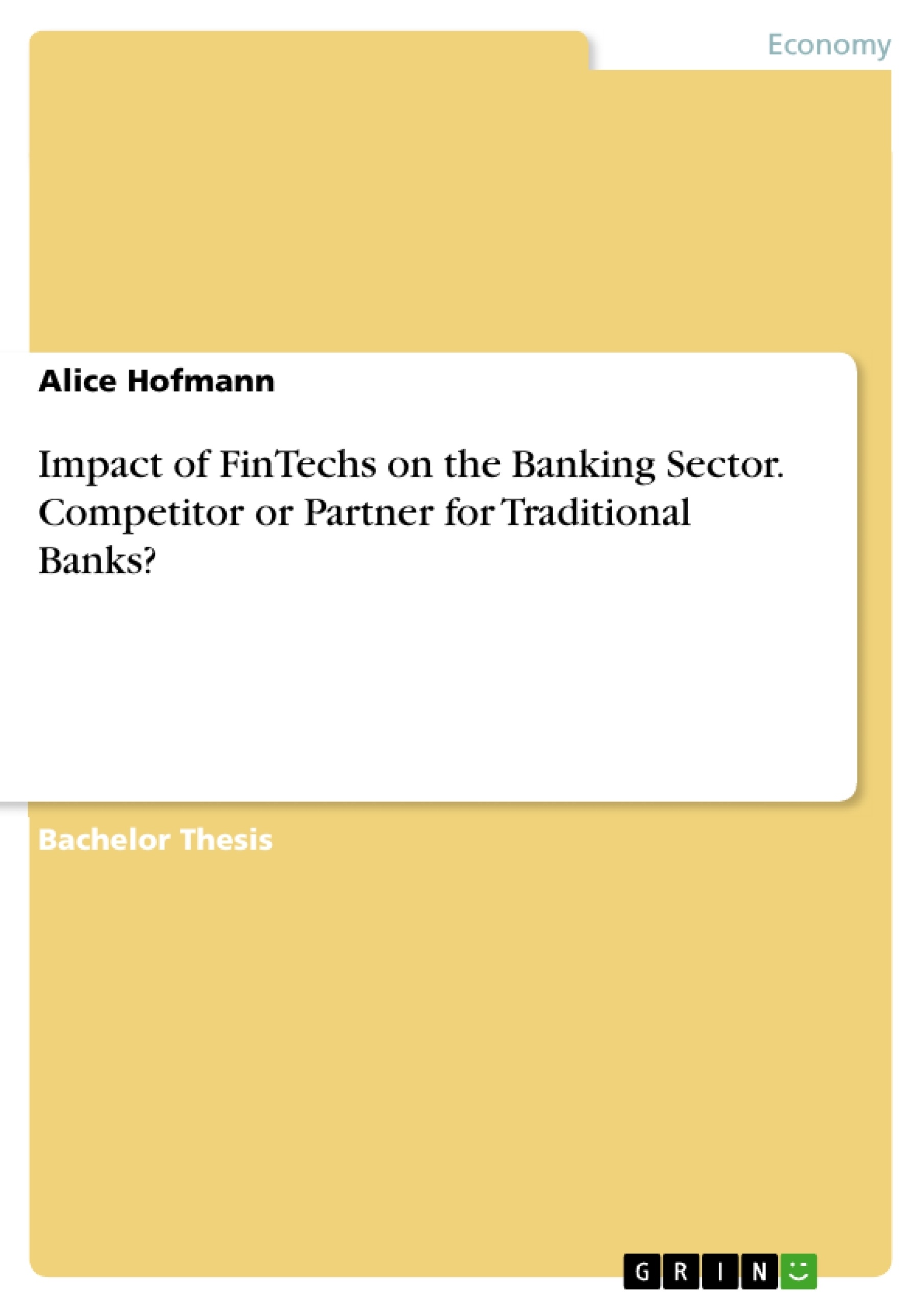This paper will analyse, if traditional banks deal with the continuous digitization and new technology-based competitors, especially FinTechs, as a threat or rather as a chance for their own business model. Is it more likely that banks and FinTechs will link up as partners to benefit from mutual competitive advantages, or will it degenerate into a battle for power and market share? Furthermore, why is it that small start-ups can present such a threat to established banks that have been operating for years?
Innovative start-ups revolutionized several business sectors. There was Napster for the music industry, Uber for the taxi industry, and there are FinTechs for the financial sector. FinTech is an abbreviation for Financial Technology. The designation itself already gives an idea of what their business idea looks like. Intelligent technologies and the continuously expanding digitization across all business sectors expands the customers' needs and demands towards banks.
They want to take care of banking business as easily and convenient as they order goods via Amazon, ask Google for the way or stream music and movies online via Spotify or Netflix. FinTech has recognized that change in customer behaviour and started to build their business models based on these findings. Those new innovative market entrants are present in every part of the value chain of a traditional bank, offering alternative financial products and services on a purely online basis. Traditional banks are, therefore, facing significant challenges and risks that are endangering their competitiveness.
Inhaltsverzeichnis (Table of Contents)
- 1. Introduction
- 2. Digital Revolution
- 2.1 Drivers of digitization
- 2.2 How digitization impacts the financial sector
- 2.2.1 Classical bank model
- 2.2.2 Innovations in the bank model
- 3. Overview of FinTechs variety
- 3.1 Types of FinTechs
- 3.1.1 Credit
- 3.1.2 Payment technologies
- 3.1.3 Wealth management
- 3.1.4 Service provider
- 3.2 Practical example N26
- 3.1 Types of FinTechs
- 4. Impacts of FinTechs on the banking sector
- 4.1 Risks and challenges concerning traditional banks
- 4.2 How banks master the challenge
- 4.2.1 Own technologies and brands
- 4.2.2 Cooperation and partnerships
- 4.2.3 Investments and acquisitions
- 4.3 Recommendations for both sides
- 5. Conclusion
Zielsetzung und Themenschwerpunkte (Objectives and Key Themes)
This dissertation aims to explore the relationship between FinTech companies and traditional banks, examining the impact of FinTechs on the banking sector and considering potential partnerships and competitive dynamics.
- The rise of FinTechs and their impact on the financial services industry
- The challenges and opportunities faced by traditional banks in a digital age
- The various types and activities of FinTech companies
- Potential partnerships and collaborations between banks and FinTechs
- The future of the financial sector in light of the FinTech revolution
Zusammenfassung der Kapitel (Chapter Summaries)
The first chapter introduces the concept of FinTechs and their significance in the financial sector, highlighting the increasing digitization and customer demand for innovative solutions. The second chapter explores the drivers of digitization, focusing on how these drivers affect the traditional banking model and its value chain. It further delves into the different types of FinTech companies, including credit, payment technologies, wealth management, and service providers. The chapter concludes with a practical example of the FinTech company N26. Chapter four examines the impacts of FinTechs on the banking sector, discussing the risks and challenges faced by traditional banks. It then explores how banks can adapt to these challenges through various strategies, such as developing their own technologies, forging partnerships with FinTechs, and making investments in the sector. The chapter concludes with recommendations for both sides.
Schlüsselwörter (Keywords)
The paper focuses on key terms and concepts such as FinTech, digital revolution, banking sector, digitization, innovation, customer behavior, risks and challenges, partnerships, investments, and the future of finance.
Frequently Asked Questions
Are FinTechs a threat or a partner to traditional banks?
The paper explores this duality, noting that while FinTechs challenge traditional models, many banks now view them as partners to leverage mutual competitive advantages through collaboration.
What does the term 'FinTech' stand for?
FinTech is an abbreviation for Financial Technology, referring to innovative, technology-based companies that offer alternative financial products and services.
Why do small start-ups pose a risk to established banks?
Start-ups are often more agile and have recognized shifts in customer behavior, offering user-friendly, purely online services that meet modern digital demands better than traditional structures.
How are traditional banks responding to the FinTech revolution?
Banks are adapting by developing their own digital brands, forging strategic partnerships, or acquiring FinTech companies to integrate new technologies into their value chain.
What is N26 and why is it mentioned?
N26 is used as a practical example of a successful FinTech that has revolutionized mobile banking and serves as a case study for digital disruption in the financial sector.
- Quote paper
- Alice Hofmann (Author), 2018, Impact of FinTechs on the Banking Sector. Competitor or Partner for Traditional Banks?, Munich, GRIN Verlag, https://www.grin.com/document/1014867



